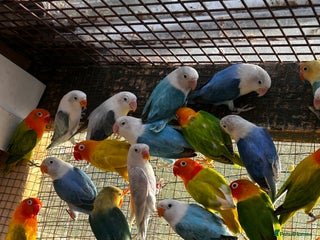Blue Lovebirds Birds for sale in Coventry, West Midlands
4 Blue Lovebirds Birds for sale in Coventry, West Midlands
Lovebirds, also known simply as love birds, are small, vibrant parrots originating from the African continent. These birds are renowned for their strong pair bonding and affectionate nature, which is what gives them their charming nickname. Physically, lovebirds are compact with a stocky build, often displaying a bright green plumage with various species showing distinctive colour patches such as peach, blue, or rosy faces. Their size and colourful feathers make them a popular choice among bird enthusiasts in the UK. Temperamentally, lovebirds are lively, social, and playful creatures that thrive in pairs or groups. They are known for their affectionate behaviour, often seen cuddling or grooming their partners, making them a symbol of love and companionship. As pets, they require spacious cages, mental stimulation, and social interaction to remain happy and healthy. Their suitability for UK bird keepers comes from their manageable size and engaging personalities, although prospective owners should be prepared for their noisy calls and exercise needs. Keywords to note: lovebirds for sale, love birds price, peach faced lovebird for sale, rosy-faced lovebird price.

Mutations oplines Fishers lovebirds in Birmingham
Lovebirds
Beautiful opline lovebirds available Blue oplines , Green opline Dilute opline Mostly birds have DNA certificates Price Start from £60 each bird onwards Age from 3 months to 12 months old. Please cont

Blackmasked baby lovebird for sale.
Lovebirds
I have baby lovebirds for sale.DNA confirmed. They are from June and July, very active and happy birds.Blackmasked £60 each. Blue 1 male,3 female. Green 2 female. I'm a breeder.

LoveBirds
Lovebirds
Blue lovebirds mixed ages. please don't hesitate for more informations. thanks £50/- Each and 2 for £80/-
FAQs
Should I get 1 or 2 lovebirds?
Deciding between one or two lovebirds depends on your lifestyle and availability. A single lovebird can bond closely with you if you provide daily interaction, play, and mental stimulation. However, if you have limited time, a pair of lovebirds might be better as they entertain and bond with each other, reducing loneliness but potentially showing less interest in human interaction. If keeping two, introductions should be gradual and supervised to avoid fights, and be aware that pairs may breed, which requires additional consideration.
